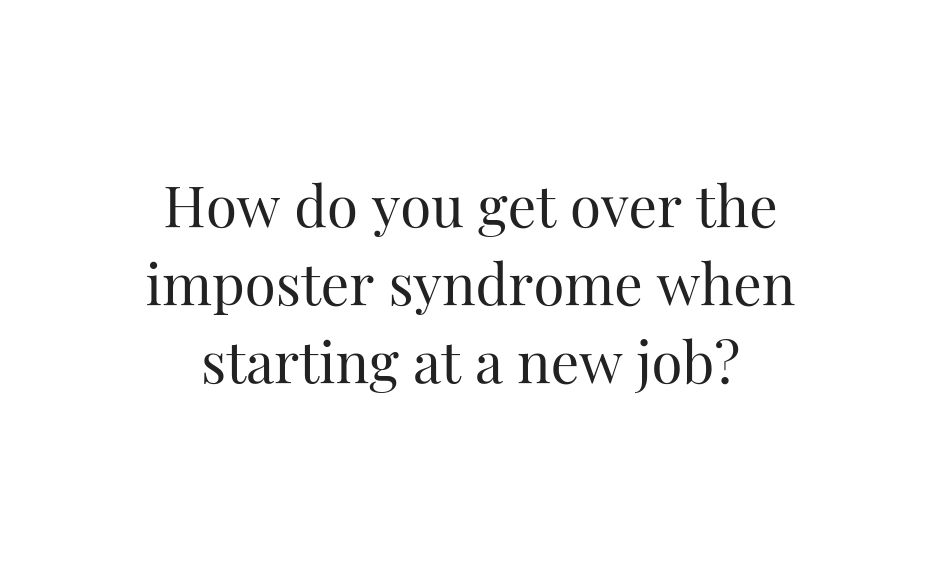Asking For a Friend | Chapter 16
Advice from Babe to Babe
Starting a new job can often be as daunting as it is exciting. From unwelcoming (or too-welcoming) coworkers, to imposter syndrome and beyond, the list of challenges isn’t short, but neither is it impossible. Fortunately, the BWH Advice Gurus have chimed in, as usual, with their best advice for navigating the workplace with grit and resilience.
I try to befriend them. Once I’ve recognized I have a coworker like this, I tell myself challenge accepted, and push myself to understand them. I find this not only helps me build my own skills in empathy, but—more often than not—ends up turning the relationship into a positive working relationship. I make a point to help this person when they ask for it, make sure I always show up with value-added deliverables and seek their advice in places they believe they have expertise. Not every unwelcoming coworker will buy into these attempts, but at the very least, everyone else around you will see how sincere you are. Take the high road and let those people react how they will. It will always say more about them than you!
—HILLARY KIRTLAND, CONTRIBUTOR
While it would be nice to be friendly with the people you work with, I’m of the belief that if it doesn’t impact my job, it doesn’t get my energy and attention. I would be sure to remain courteous and warm with everyone I interact with, but I wouldn’t bend over backwards to break through whatever walls a coworker may have up, especially if I get the sense it would be a losing battle. As long as I get the information, resources and support needed to complete the tasks at hand (i.e., retain my job), I consider our professional contract (think: social contract, but in the workplace) to be fulfilled. If a coworker’s unwelcoming behavior or exclusive nature impacts my ability to complete my assigned tasks (again, retain my job), then I would loop in other individuals (e.g., coworkers, supervisor, HR, etc.) to either serve as a buffer or as a witness to make sure their negativity does not reflect back on me.
—DIANA MORRIS, BABE #182
I like to look at this way: We spend more time at our workplaces—surrounded by our coworkers—than we spend at home with our families. As such, coworkers can become somewhat like family to us, and that can become tricky and sometimes territorial. I think—at least at larger organizations—being the "new guy" and having to work to build relationships with our coworkers as "the outsider" is part of the process, unfortunately. Navigating the "new guy" phase with confidence and the mindset that you're there for a reason and that you have a lot to bring to the table will, hopefully, allow your coworkers to ease up with time. Also, morning coffee and donuts don't hurt.
—CHELSEA DUDEVOIRE, FOUNDER + CEO
“Too close” is completely relative to your comfort level, your job responsibilities, your office environment, your HR policies—the list goes on and there’s no official answer. I suggest taking stock of what you gain from any particular relationship, what you could potentially lose if things go sour, and doing a cost-benefit analysis to determine if it’s worth it to you. If a level of familiarity will put your job performance at risk and you value your performance more than toeing that line, there’s your answer. If you naturally get to a point where the benefits of a friendship will not trickle into the job, there’s your answer, too. Overall, be mindful of what you’re sharing, who you’re sharing it with and what you have to gain and lose along the way.
—DIANA MORRIS, BABE #182
Obviously there are situations where friendships can make work complicated, but for me there is no rule. Some of my best friends, to this day, were made through work, and they are worth more to me than any job I've held. For the right people, there is no such thing as too close.
—ASHLIE JOHNSON COGGINS, CONTRIBUTOR
I would assume a lot of this answer depends on criteria such as (1) what kind of job you have/what the industry is and (2) what your coworkers’ positions are, in comparison to yours. I had made extremely close friends with coworkers in the past, and now we all work at different companies and are still friends who see one another regularly. My advice would be just do what feels appropriate and is reciprocated.
—NICOLE NARVAEZ, BABE #33
I’ll start by saying I’ve met many of my closest friends (and my significant other!) through work—so I totally understand how tricky this can be! It’s all about setting boundaries and being very clear in the up-front. I might sit side-by-side with my best friend, but if I want to discuss my weekend or complain about my workload, we make sure to go for a coffee run or schedule a Wine Wednesday for after work hours. Even just setting guidelines for social platforms can be helpful. For example, my SO and I would only use work email professionally, and I’d text him when I was getting ready to head out or to make plans for the evening.
—MANDY SHOLD, BABE # 154
Lol.
—CHELSEA DUDEVOIRE, FOUNDER + CEO
Here’s the secret: you don’t. Imposter syndrome is real and I haven’t met anyone who considers themselves successful, that doesn’t feel it. Great news is that there are ways to combat imposter syndrome when it rears its ugly head. Start with knowing your worth by doing your research. What do other people in your position make? What level of education do they have? Who else can do what you do, when and where you do it? Are you adding value to your organization above and beyond your job description (in a way that makes a difference to the bottom line)? Once you know what’s going on around you, you’ll probably find that you’re kicking butt. So take stock, do your research, and fake it until you make it. You got this!
—HILLARY KIRTLAND, CONTRIBUTOR
Reminding yourself that you were hired because you fit the job and not just by chance or luck is a great way to overcome it. Also keeping a list of special skills you have that others may not (bilingual, leadership experience, etc) can be helpful as well. It’s also important to note that I don’t think imposter syndrome ever fully goes away, and it’s okay to have moments of doubt, as long as you have techniques to overcome it.
—THAIS LAGE, BABE #151
I’ve owned my business for 4+ years and I still deal with imposter syndrome, sis! I think we all do in waves, especially as women. Personally, I do two things: 1. Fake it. You’d be surprised how pushing past your mind and acting confident will actually make you feel more confident. 2. I use a planner/goal setting journal (I like the Get To Work Book) and I keep track of daily, weekly, and monthly goals. Then at the end of the week and month I reflect on all the amazing things I accomplished. It reminds me that I am in fact an expert and that I’m totally more than fit to do what I do.
—KAYLA BECKMANN BARNHART, BABE #85
Until Next Week,
—THE BWH ADVICE GURUS
About:
Asking for a Friend is Babes Who Hustle's weekly advice column that asks and answers the work-related questions on all of our minds. Looking for advice and guidance? Hit us with all of your questions below and stay tuned for next Wednesday's edition!







